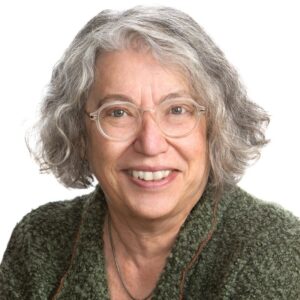
Gail Ouellette, PhD
Dr. Gail Ouellette is a geneticist and genetic counsellor by training and the former founding president of the Regroupement Québécois des Maladies Orphelines (RQMO)/Quebec Coalition of Orphan Diseases. Gail is also a member (and co-chair for 2024) of the Implementation Advisory Group for the National Strategy for Drugs for Rare Diseases.
Gail obtained her Ph.D. in molecular genetics at Université de Montréal and did her postdoctoral studies in genetic epidemiology at the Centre for Human Genetics in Leuven, Belgium, and worked in research in gene discovery for complex diseases in founder populations. In 1999, she left the lab and the computer to train in the Master program in genetic counselling at McGill University. She then worked as a genetic counsellor at the Centre hospitalier universitaire de Sherbrooke (CHUS). During this time, she collaborated with patient organizations in Quebec, co-founded the RQMO in 2010, and set up a bilingual rare disease portal/help line service for rare diseases – the iRARE Centre. In partnership with CanPKU+, she has founded the Canadian iRARE Centres to extend this service to all Canadians.
Here is what she has to say about rare diseases:
In your opinion, what are some of the biggest challenges facing the rare disease community today?
“The biggest challenge is the absence of comprehensive and integrated rare disease action plans in the Canadian provinces’ health systems (except Quebec). Such action plans should respond to patients’ and caregivers’ needs in terms of information, diagnosis, care, psychosocial issues, treatment, and research. Federal/provincial/territorial negotiations are ongoing since the federal government’s investment of $1.5 billion, but the stakeholders are not being consulted in each province. Health and social services are a provincial jurisdiction and that is where patients, caregivers, and clinicians face challenges and should be able to express their views to make changes.”
What are specific areas within the rare disease landscape that particularly excite you and why?
“Information: patients and caregivers are often not provided with information on their rare disease, its management, and ongoing research. That is why, through the RQMO, I set up an iRARE Centre in Quebec to respond to any questions about any rare disease. And now the service is being extended to the rest of Canada with the Canadian iRARE Centres organization. Another area which excites me is genetics education. The medical profession and patients should be better informed about all the possible genetic testing options (diagnosis by genomics, family screening, population preconception screening, etc.).”
How would you describe yourself in one sentence?
“Someone who likes to bring knowledge to anyone in an understandable way.”

